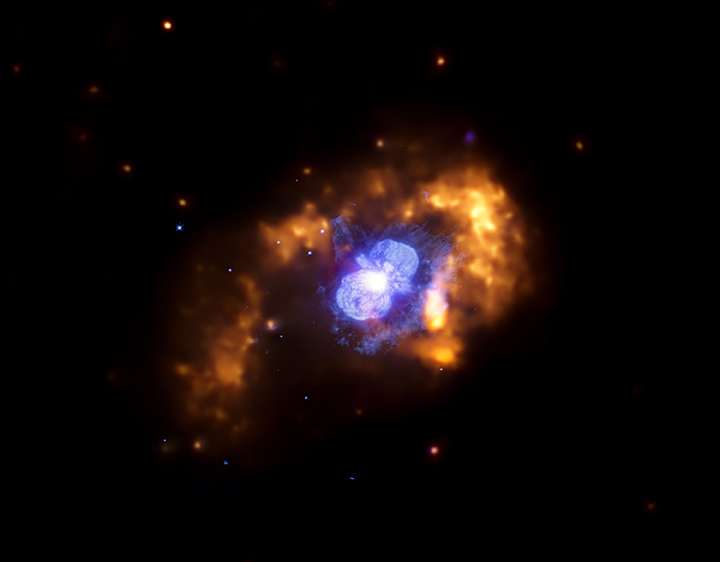Yes, I believe Ole Romer utilized this method to determine the speed of light in 1676. And quite successfully given the solar system data he had to work with.You can start by learning what parallax is and what it tells us.
However as with the rest of your post, which I truly thank you for, it failed to address the question asked.
I am not asking how the distance is derived or the age of the data is derived. Nor am I asking about "why" light travels at an invariant 'c' across a vacuum [ your first link ]
The image provided by Grumpy is a snap shot of events that occurred 2645 million years ago and I am asking how this is deemed to be relevant to today's universe given that the image is depicting events that are 2645 million years into the past.

I am not presuming anything about the competency of the scientists who consider this image to be relevant.
I am asking what method they use to determine that it is relevant to today's universe.
However, be careful what you ask. You tend to embed assumptions in the questions, and the assumptions tend to be incorrect. Be careful that the answers are almost always complicated, and you will often get the simplified or generalized answer until you are able to understand more complex concepts. However, you are committing a recurring fallacy, which is, you assuming false the facts already proven true (and vice versa) and you are doing so arbitrarily without trying to learn the underlying facts that explain how scientists have arrived at these fundamental concepts.
If you are referring to the belief that light travels across a vacuum at 'c', you need to be aware that the belief is founded on the limitations of the scientific imagination and not necessarily the reality of the universe.
However your point is taken accepted and appreciated.
You will also notice that the answer given to the question about invariance of light totally avoided, the question as to why is light invariant, not that it is.
Why exactly is the speed of light constant in vacuum? I know that's what happens, but I want to know why. Relativity simply works under the assumption of light's constant speed, but that doesn't prove it. It's sort of like saying the product of two numbers is equal to the sum of the same two numbers just because 2+2=2x2. A proof requires more than a phenomenon.
- Bill (age 16)
vancouver, BC, Canada
A damn good question too I might add and one that has yet to be answered, IMO.
What we really have is a failure to communicate properly.
I ask a question that is simple and straight forward. I place a qualifier on it that suggests that light traveling across a vacuum is only a belief [ suggesting by implication that I may believe that this has yet to be verified according to the scientific method.]
I have since stated that the a lack of alternative to "traveling across the void" may in itself be insufficient excuse, for the existing model to pass the scientific method.
you need to be aware that the belief is founded on the limitations of the scientific imagination and not necessarily the reality of the universe.
So I have upset you and others by implying that the scientific imagination of 1600's right through until the discovery of Quantum Entanglement was some how deficient? Is that it?
I acknowledge your point and accept it's intent to educate me as well intended.The method complies with the method when the investigators are in compliance. There are many ways to confirm compliance. If you don't know how this is done, you shouldn't assume that it's not being done. That's just a arbitrary decision with no facts or evidence to support it. Two suggestions. One is to read. Buy a few textbooks, get a decent telescope and learn a little astronomy. There are plenty of free lectures on places like You Tube and TedTalks. Subscribe to a few astronomy journals. Another is to sign up for a university course in astronomy and try to get some telescope time. Somewhere in the middle of that take a class in geometry and try to learn some basic axioms and how to derive their proofs. Eventually you will be in a position to know that the concepts you now believe to be true are not only false, but fallacious. Eventually you will learn to estimate the age of a distant object yourself.
but even I know that even the most clever of us regardless of profession, can be found to be over confident and mistaken when dealing with (scientific) premises that have not been fully assessed or subjected to rigorous scrutiny.
The fact that science has an issue with this Dark matter/Energy conundrum could very well be because they accept Ole Romer's presumptions of a traveling photon with out questioning too deeply it's fundamental correctness.
To me the image of Abel 502 is a current image of events happening today. [ as light does not travel across a void of vacuum as the light effect is a quantum entanglement phenomena generating surface resonance ]..to you the events are 2645 million years ago. Proving my hypothesis according to the scientific method though is another thing....
This doesn't imply that I believe scientists are somehow stupid, which you appear to be inferring, it simply means that the limitations of the light effect model need to be looked at thoroughly. IMO
Last edited:

